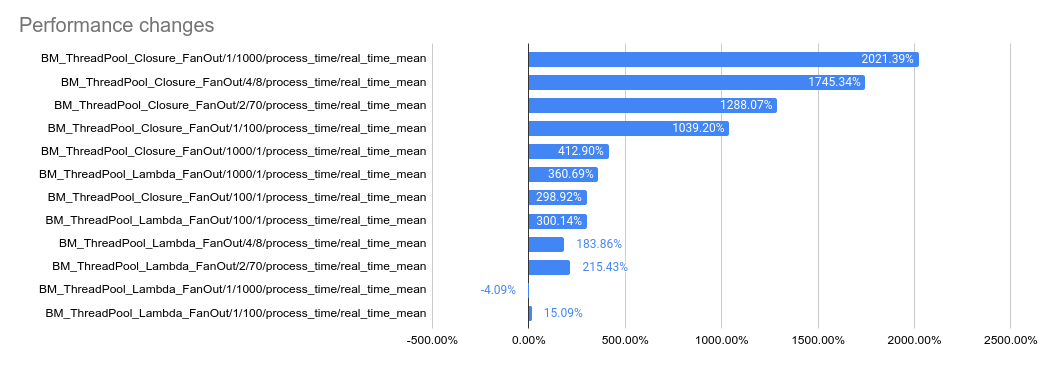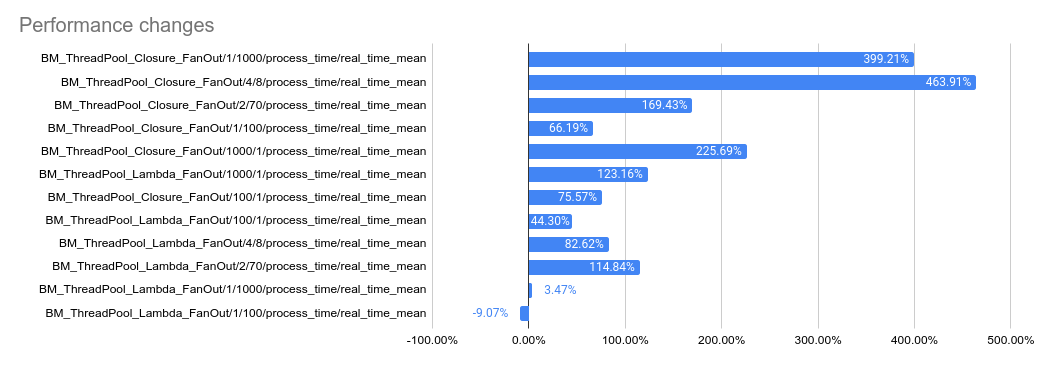This reverts the following PRs: #32692#33087#33093#33427#33568
These changes seem to have introduced some flaky crashes. Reverting
while I investigate.
As per gRFC A58, when WRR sees a subchannel report READY, it reset the
non_empty_since value, thus restarting the blackout period. However,
there were two cases where we were incorrectly triggering this code:
1. When WRR got an updated address list that contained addresses that
were already present on the old list and whose subchannels were already
in READY state, the initial notification for those subchannels on the
new list was READY, which incorrectly triggered resetting the
non_empty_since value.
2. Due to a bug in the outlier_detection policy, whenever an update was
propagated down through the OD policy without actually enabling OD, it
would incorrectly send a duplicate connectivity state notification for
the subchannels. This meant that a subchannel that was already in state
READY would report READY again, which would also incorrectly trigger
resetting the non_empty_since value.
This PR makes two changes:
1. Fix the bug in outlier_detection that caused it to generate the
spurious duplicate READY updates.
2. Fix WRR to reset the non_empty_since value when a subchannel goes
READY only if the subchannel has seen a previous state update and only
if that previous state was not READY. (The duplicate READY notifications
should not actually happen anymore now that the OD policy has been
fixed, but better to be defensive.)
Fixes b/290983884.
In real services most of our time ends up in the `Read1()` function,
which populates one byte into the bit buffer.
Change this to read in as many as possible bytes at a time into that
buffer.
Additionally, generate all possible (to some depth) parser geometries,
and add a benchmark for them. Run that benchmark and select the best
geometry for decoding base64 strings (since this is the main use-case).
(gives about a 30% speed boost parsing base64 then huffman encoded
random binary strings)
---------
Co-authored-by: ctiller <ctiller@users.noreply.github.com>
More work on the dualstack backend design:
- Now that all petiole policies have been changed to delegate to
pick_first, outlier detection no longer needs to eject via the
subchannel's raw connectivity state; it can now eject only via the
health state. See #33340.
- This also removes the now-unnecessary hack to explicitly disable
outlier detection in pick_first. See #33336.
More work on the dualstack backend design:
- Change ring_hash policy to delegate to pick_first instead of creating
subchannels directly.
- Note that, as mentioned in the WIP gRFC, because we lazily create the
pick_first child policies, so there's no need to swap over to a new list
as an atomic whole. As a result, we don't use the endpoint_list library
in this policy; instead, we just update a map in-place.
- Remove now-unused subchannel_list library.
More work on the dualstack backend design:
- Change round_robin to delegate to pick_first instead of creating
subchannels directly.
- Change pick_first such that when it is the child of a petiole policy,
it will unconditionally start a health watch.
- Change the client-side health checking code such that if client-side
health checking is not enabled, it will return the subchannel's raw
connectivity state.
- As part of this, we introduce a new endpoint_list library to be used
by petiole policies, which is intended to replace the existing
subchannel_list library. The only policy that will still directly
interact with subchannels is pick_first, so the relevant parts of the
subchannel_list functionality have been copied directly into that
policy. The subchannel_list library will be removed after all petiole
policies are updated to delegate to pick_first.
Add bazel dependency on opentelemetry-cpp.
<!--
If you know who should review your pull request, please assign it to
that
person, otherwise the pull request would get assigned randomly.
If your pull request is for a specific language, please add the
appropriate
lang label.
-->
The address attribute interface was intended to provide a mechanism to
pass attributes separately from channel args, for values that do not
affect subchannel behavior and therefore do not need to be present in
the subchannel key, which does include channel args. However, the
mechanism as currently designed is fairly clunky and is probably not the
direction we will want to go in the long term.
Eventually, we will want some mechanism for registering channel args,
which would provide a cleaner way to indicate that a given channel arg
should not be used in the subchannel key, so that we don't need a
completely different mechanism. For now, this PR is just doing an
interim step, which is to establish a special channel arg key prefix to
indicate that an arg is not needed in the subchannel key.
<!--
If you know who should review your pull request, please assign it to
that
person, otherwise the pull request would get assigned randomly.
If your pull request is for a specific language, please add the
appropriate
lang label.
-->
The following bugs are fixed:
* Missing ExecCtx in event engine endpoints and listeners
* Ref counting issue with iomgr endpoint which causes crashes in
overloaded situations
The PR includes a test which triggers these bugs by simulating an
overloaded system.
- Switched from yapf to black
- Reconfigure isort for black
- Resolve black/pylint idiosyncrasies
Note: I used `--experimental-string-processing` because black was
producing "implicit string concatenation", similar to what described
here: https://github.com/psf/black/issues/1837. While currently this
feature is experimental, it will be enabled by default:
https://github.com/psf/black/issues/2188. After running black with the
new string processing so that the generated code merges these `"hello" "
world"` strings concatenations, then I removed
`--experimental-string-processing` for stability, and regenerated the
code again.
To the reviewer: don't even try to open "Files Changed" tab 😄 It's
better to review commit-by-commit, and ignore `run black and isort`.
<!--
If you know who should review your pull request, please assign it to
that
person, otherwise the pull request would get assigned randomly.
If your pull request is for a specific language, please add the
appropriate
lang label.
-->
Following improvements were made to `orca_oob` interop test to increase
compatibility and stability:
1. Timeout was increased to 10s (see #33098)
2. Server will block clients trying to run this test concurrently.
3. Data is cleared in the beginning of the call.
Added tests involve:
1. Checking the # of logger invocations with multiple RBACs in the
chain.
2. Verifying content in audit context with action and audit condition
permutations.
3. Confirm custom logger and built-in logger configurations are working.
4. Confirm the feature is protected by the environment variable.
---------
Co-authored-by: rockspore <rockspore@users.noreply.github.com>
- switch to json_object_loader for config parsing
- use `absl::string_view` instead of `const char*` for cert provider
names
- change cert provider registry to use a map instead of a vector
- remove unused mesh_ca cert provider factory
I generated a new client key and cert where a Spiffe ID is added as the
URI SAN. As such, we are able to test the audit log contains the
principal correctly.
Update: I switched to use the test logger to verify the log content and
removed stdout logger here because one the failure of [RBE Windows Debug
C/C++](https://source.cloud.google.com/results/invocations/c3187f41-bb1f-44b3-b2b1-23f38e47386d).
Update again: Refactored the test logger in a util such that the authz
engine test also uses the same logger. Subsequently, xDS e2e test will
also use it.
---------
Co-authored-by: rockspore <rockspore@users.noreply.github.com>
Upgrade apple platform deployment_target versions to fix the cocoapods
push of BoringSSL-GRPC about the following error:
```
ld: file not found: /Applications/Xcode.app/Contents/Developer/Toolchains/XcodeDefault.xctoolchain/usr/lib/arc/libarclite_macosx.a
clang: error: linker command failed with exit code 1 (use -v to see invocation)
```
ref: https://developer.apple.com/forums/thread/725300
This also aligns with the versions required by
[protobuf](https://github.com/protocolbuffers/protobuf/pull/10652)
```
ios.deployment_target = '10.0'
osx.deployment_target = '10.12'
tvos.deployment_target = '12.0'
watchos.deployment_target = '6.0'
```
`tools/run_tests/sanity/check_absl_mutex.sh` was broken, a missing paren
crashed the script if run locally. It's unclear yet how our sanity
checks were not complaining about this, `run_tests.py` does not save the
log.
This makes the JSON API visible as part of the C-core API, but in the
`experimental` namespace. It will be used as part of various
experimental APIs that we will be introducing in the near future, such
as the audit logging API.
This PR implements a work-stealing thread pool for use inside
EventEngine implementations. Because of historical risks here, I've
guarded the new implementation behind an experiment flag:
`GRPC_EXPERIMENTS=work_stealing`. Current default behavior is the
original thread pool implementation.
Benchmarks look very promising:
```
bazel test \
--test_timeout=300 \
--config=opt -c opt \
--test_output=streamed \
--test_arg='--benchmark_format=csv' \
--test_arg='--benchmark_min_time=0.15' \
--test_arg='--benchmark_filter=_FanOut' \
--test_arg='--benchmark_repetitions=15' \
--test_arg='--benchmark_report_aggregates_only=true' \
test/cpp/microbenchmarks:bm_thread_pool
```
2023-05-04: `bm_thread_pool` benchmark results on my local machine (64
core ThreadRipper PRO 3995WX, 256GB memory), comparing this PR to
master:

2023-05-04: `bm_thread_pool` benchmark results in the Linux RBE
environment (unsure of machine configuration, likely small), comparing
this PR to master.

---------
Co-authored-by: drfloob <drfloob@users.noreply.github.com>
Reverts grpc/grpc#33002. Breaks internal builds:
`.../privacy_context:filters does not depend on a module exporting
'.../src/core/lib/channel/context.h'`
Change call attributes to be stored in a `ChunkedVector` instead of
`std::map<>`, so that the storage can be allocated on the arena. This
means that we're now doing a linear search instead of a map lookup, but
the total number of attributes is expected to be low enough that that
should be okay.
Also, we now hide the actual data structure inside of the
`ServiceConfigCallData` object, which required some changes to the
`ConfigSelector` API. Previously, the `ConfigSelector` would return a
`CallConfig` struct, and the client channel would then use the data in
that struct to populate the `ServiceConfigCallData`. This PR changes
that such that the client channel creates the `ServiceConfigCallData`
before invoking the `ConfigSelector`, and it passes the
`ServiceConfigCallData` into the `ConfigSelector` so that the
`ConfigSelector` can populate it directly.
<!--
If you know who should review your pull request, please assign it to
that
person, otherwise the pull request would get assigned randomly.
If your pull request is for a specific language, please add the
appropriate
lang label.
-->